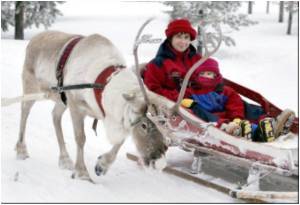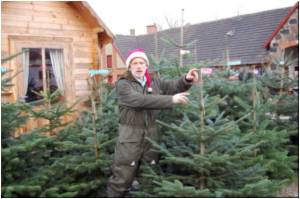In Finland, it's just not Christmas until one Turku city bureaucrat says so, promising to punish troublemakers according to a solemn medieval tradition that died out centuries ago

"We know there is a version of this from the 1600s that was much longer, very detailed, and with much harsher punishments," he says.
This is no Hallmark greeting. The Declaration all but orders citizens to be quiet and respectful of Christmas - or else.
"He who breaks this peace and violates the peace of Christmas by any illegal or improper behaviour shall under aggravating circumstances be guilty and punished," warns the intricately decorated scroll, which is a 50-year-old reproduction of the original text.
Every year, once the bells of the Turku Cathedral have tolled midday on Christmas Eve, the Chief of Administration steps onto a balcony in the old market square amid military fanfare to read the declaration.
The event is broadcast on national television and radio, and for many families is the precise moment when they can begin celebrating the holiday.
Advertisement
"It's a very important event for many people. Even in bad weather there are 10,000 people out there in the square to hear it," Lehmusto says.
Advertisement
"The local ruler gave his personal guarantee that war and violence would stop for Christmas... All work was forbidden unless it was absolutely necessary, like feeding livestock," says Turku historian Tarja-Tuulikki Laaksonen.
Even having guests was forbidden without express permission from local authorities.
Laaksonen says the fine for violating the peace was often so severe that the perpetrator could be in debt for a lifetime.
Punishments for violating the declaration were not stricken from Finnish law books until the 1970s.
Even though a handful of other Finnish towns also declare their own version of a Christmas Peace, it is believed that Turku's declaration is the longest-running form of the medieval tradition anywhere in the world, nearly uninterrupted save by both World Wars and Finland's war of independence in 1917.
"In Sweden, in the times of King Gustav III, people got bored with the declaration," Laaksonen says, saying that the admonition for silence and devotion was during his reign in the 18th century being abandoned in Europe in favour of Christmas music and revelry.
Lehmusto, after pondering why Finland should have clung to a fading tradition, says that there is something about the gravity of the declaration that resonates with the Finnish national character and state of mind.
"Finns' approach to Christmas is still somehow more devout, we emphasise quietness when elsewhere it is more of a party," he says.
Lehmusto, an older gentleman with a beard that is more salt than pepper, is a Christmas icon who is nearly as recognisable as Santa Claus to Finns after ushering in the holiday for nearly a decade.
But for the ageing civil servant, this Christmas Eve will be the last time he unfurls his parchment on the balcony of the old Brinkkala House and booms the opening words: "Tomorrow, God willing, is the graceful celebration of the birth of our Lord..."
Retirement calls, and next year Lehmusto says he will join the crowds beneath the balcony.
"It's always been a tradition in my family, too," he says quietly.
Source-AFP














